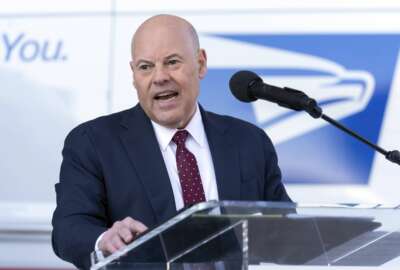USPS faces higher bar to deny religious accommodation after SCOTUS sends ex-carrier’s case back to lower court
The Supreme Court, in the case of a former mail carrier who declined to work Sundays, is setting a higher standard for employers in and out of government to reject...
The Supreme Court, in the case of a former mail carrier who declined to work Sundays, is setting a higher standard for employers in and out of government to reject religious accommodations in the workplace.
The court, in a unanimous opinion issued Thursday, clarified businesses must grant religious accommodations to workers, unless doing so would result in “substantial increased costs” carrying out the business.
The court’s ruling in Groff v. DeJoy raises the bar from a previous requirement that employers must demonstrate more than “de minimis,” or minor costs to claim a religious accommodation is unreasonable.
The Supreme Court made its ruling in the case of Gerald Groff, a former rural letter carrier in Lancaster, Pennsylvania.
Groff, an Evangelical Christian who observes Sundays as a day of rest, argued the Postal Service violated his rights under the 1964 Civil Rights Act, when his post office scheduled him to work Sundays.
Title VII of the Civil Rights Act prohibits employment discrimination based on race, color, religion, sex and national origin.
“Faced with an accommodation request like Groff’s, an employer must do more [than] conclude that forcing other employees to work overtime would constitute an undue hardship. Consideration of other options would also be necessary,” the court wrote in its opinion.
Attorneys for both the plaintiff and the solicitor general, which represented the Postal Service, told the court during oral arguments in April that the current “de minimis” standard for religious accommodations required additional clarification.
The Supreme Court’s ruling, however, is not the final word on the specifics of Groff’s case against USPS.
The court is sending his case back to the Third Circuit of the U.S. Court of Appeals, which will determine whether USPS can demonstrate Groff’s religious accommodation would incur “substantial increased costs,” and would be considered unreasonable under the Supreme Court’s new standard.
USPS said in a statement it expects the lower court will once again rule in its favor.
“We agree with the Supreme Court’s clarification, which accepts the arguments we made before the Court, and which is fully consistent with the standard we apply when seeking to accommodate the sincerely held religious beliefs, observances, and practices of our employees,” USPS said in its statement. “For those reasons, and because we believe the lower court will conclude that providing the requested accommodation here would impose a substantial burden on the Postal Service, we are confident that the Postal Service will again prevail when the case is remanded.”
The Third Circuit previously ruled in favor of USPS, and found that exempting Groff from Sunday work had “imposed on his coworkers, disrupted the workplace and workflow, and diminished employee morale.”
USPS, however, acknowledged in lower court rulings that exempting him from Sunday delivery “would impose no meaningful burden on USPS,” but argued the accommodation would require his coworkers to cover more Sunday shifts.
USPS didn’t require Groff to work Sundays when he started working for the agency. But that started to change in 2013, when it reached a deal with Amazon to deliver its packages on Sundays.
USPS told the lower courts that its finances had been “steadily worsening,” and that the agency had reported a record $16 billion net loss in 2012.
Managers at Groff’s post office suggested several accommodations — including having Groff work Sundays after church, or allowing Groff to have another day during the week as a day of worship, if he was scheduled to work on Sunday.
Post office management also offered to contact carriers from nearby post offices to cover for Groff, if he was scheduled to work Sundays.
Groff resigned from his job as a rural carrier assistant in January 2019, several years after USPS management disciplined him for not showing up for his scheduled shifts on Sundays.
Solicitor General Elizabeth Prelogar said in April that one mail carrier working in the same post office as Groff quit, and another carrier transferred to a new post office. A third filed a union grievance.
The Supreme Court ruling doesn’t go as far as what Groff’s legal team sought — requiring employers to grant religious accommodations unless they pose a “significant difficulty or expense,” which is the same standard for disability accommodations under the Americans with Disabilities Act.
Groff and religious liberty advocates representing him, however, said they consider Thursday’s Supreme Court ruling a victory for their cause.
“I hope this decision allows others to be able to maintain their convictions without living in fear of losing their jobs because of what they believe,” Groff said.
Aaron Streett, the attorney who represented Groff during oral arguments, said the ruling upholds the “religious liberty rights of every employee.”
“Our nation has a long history of protecting its employees from being treated differently at work just because of their faith. This decision is consistent with that history and is a tremendous win for all people of faith,” Streett said.
Groff’s case is the first time in more than 50 years that the Supreme Court revisited its 1977 ruling in Trans World Airlines, Inc. v. Hardison, which set the “de minimus” standard for religious accommodations in the workplace.
Regulations from the Equal Employment Opportunity Commission later clarified that employers must “make reasonable accommodations to the religious needs of employees” whenever doing so would not create “undue hardship” on the conduct of the employer’s business.
Justice Samuel Alito, in the court’s opinion, said its ruling would mean “little, if any change” to the EEOC’s guidance on religious accommodations in the workplace.
“What is most important is that ‘undue hardship’ in Title VII means what it says, and courts should resolve whether a hardship would be substantial in the context of an employer’s business in the commonsense manner that it would use in applying any such test,” Alito wrote.
EEOC guidance states businesses don’t face undue hardship in making a religious accommodation, if it requires them to incur temporary costs — including voluntary shift swapping, occasional shift swapping or administrative costs.
“We have no reservations in saying that a good deal of the EEOC’s guidance in this area is sensible and will, in all likelihood, be unaffected by our clarifying decision today,” Alito wrote.
Justices Sonia Sotomayor and Justice Ketanji Brown Jackson, in a concurring opinion, said the court wasn’t convinced by Groff’s argument that USPS should only be able to demonstrate an “undue burden” to its bottom line, but not on its workforce.
“There is no basis in the text of the statute, let alone in economics or common sense, to conclude otherwise. Indeed, for many businesses, labor is more important to the conduct of the business than any other factor,” Sotomayor and Jackson wrote.
The two justices, however, noted that not all additional labor costs qualify as an undue burden. The labor costs of coordinating voluntary shift swaps, they added, are not undue “because they are too insubstantial.”
Copyright © 2025 Federal News Network. All rights reserved. This website is not intended for users located within the European Economic Area.
Jory Heckman is a reporter at Federal News Network covering U.S. Postal Service, IRS, big data and technology issues.
Follow @jheckmanWFED






